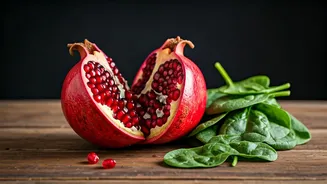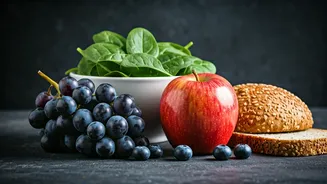Oats: The Champion
Oats are a cornerstone in the journey to lower cholesterol. They are packed with soluble fiber, specifically beta-glucan, which acts like a sponge, soaking
up cholesterol in the digestive system. This process helps to reduce the absorption of cholesterol into the bloodstream. Including oats in your diet is straightforward; a bowl of oatmeal for breakfast is a classic choice, and you can enhance it by adding fruits like berries or a sprinkle of nuts for added flavor and nutritional value. The soluble fiber in oats not only helps with cholesterol management but also contributes to better digestion and helps you feel fuller for longer, which can be beneficial for weight management as well. Regular consumption of oats can lead to a significant drop in LDL cholesterol, often referred to as 'bad' cholesterol, and may also help improve overall heart health. Remember to choose whole oats rather than instant varieties, which may contain added sugars and lack the same nutritional benefits.
Legumes: Powerhouse Partners
Legumes, including lentils, chickpeas, and kidney beans, are a powerhouse of soluble fiber and a crucial element in a cholesterol-lowering diet. The soluble fiber in legumes functions similarly to that in oats, binding to cholesterol in the digestive tract and preventing its absorption. Legumes are also a fantastic source of plant-based protein, which can help replace some of the less heart-healthy protein sources in your diet, such as red meat. Incorporating legumes into your meals can be easy and delicious. You can add lentils to soups and stews, make chickpea salads, or prepare a hearty bean curry. Legumes offer a range of nutrients beyond fiber, including vitamins and minerals, contributing to overall health. Furthermore, they are relatively inexpensive and widely available in India, making them a practical choice for improving your heart health. Regular consumption of legumes can not only reduce cholesterol but also contribute to better blood sugar control and weight management.
Nuts: A Heart's Friend
Nuts, particularly almonds, walnuts, and cashews, are beneficial allies in your quest to lower cholesterol. They are packed with healthy fats, fiber, and plant sterols, which have been shown to help reduce LDL cholesterol levels. A handful of nuts can be a nutritious snack, providing a satisfying crunch and a wealth of nutrients. However, it's essential to eat nuts in moderation, as they are calorie-dense. Aim for a small portion size, such as a quarter cup, to reap the benefits without excess calorie intake. Nuts can be incorporated into your diet in many ways: add them to your morning oatmeal, sprinkle them over salads, or enjoy them as a snack between meals. The monounsaturated and polyunsaturated fats found in nuts can help improve the ratio of good to bad cholesterol in your body. In addition to their cholesterol-lowering effects, nuts provide vital vitamins, minerals, and antioxidants, contributing to overall health and protecting your body from chronic diseases. Make sure to select unsalted varieties of nuts to keep sodium levels under control.
Fatty Fish: Omega-3 Boost
Fatty fish, such as salmon, mackerel, and sardines, are excellent sources of omega-3 fatty acids, which can significantly benefit your heart health. Omega-3s help to reduce triglycerides, lower blood pressure, and slightly increase HDL cholesterol ('good' cholesterol). Aim to include fatty fish in your diet at least twice a week to reap these benefits. Cooking fatty fish is relatively straightforward; you can bake, grill, or pan-fry it. Consider adding it to salads, preparing fish curries, or simply enjoying it with some steamed vegetables. Omega-3 fatty acids also have anti-inflammatory properties, which can contribute to overall wellness. Including fatty fish in your diet also provides you with high-quality protein and other essential nutrients, such as vitamin D. If you are not a fan of fish, you can explore omega-3 supplements, but it is always best to prioritize whole food sources.
Fruits and Vegetables
Adding fruits and vegetables to your diet is a simple yet effective strategy to naturally reduce cholesterol. These foods are low in saturated fat and cholesterol-free, while also being high in fiber, vitamins, and minerals. Fiber-rich fruits and vegetables, in particular, can help lower cholesterol by binding to it in the digestive system. Focus on including a variety of colorful fruits and vegetables, such as apples, oranges, berries, spinach, and broccoli, in your meals. You can enjoy them as snacks, add them to your main meals, or blend them into smoothies. Fruits and vegetables also offer antioxidants, which protect your cells from damage and boost your overall health. Make a habit of filling at least half your plate with fruits and vegetables during each meal. Their versatility allows you to create many different delicious combinations, and their rich nutrient content provides your body with the fuel it needs to function optimally.




















